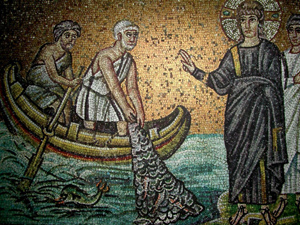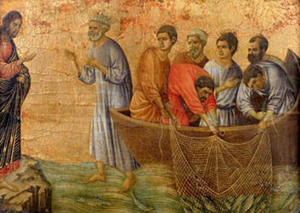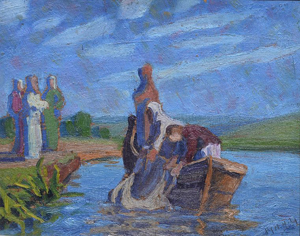For Sunday February 10, 2019
Lectionary Readings (Revised Common Lectionary, Year C)
Isaiah 6:1-8, (9-13)
Psalm 138
1 Corinthians 15:1-11
Luke 5:1-11
“Master, we have worked all night long but have caught nothing. Yet if you say so, I will let down the nets.” As Luke describes the scene in this week’s Gospel story, it’s early morning, and Simon Peter is cleaning his fishing nets after a miserable night out on the lake. He and his partners have worn themselves out, casting nets from dusk till dawn into the dark water. As the sun rises, they have nothing to show for their efforts but sore muscles and weary hearts; their nets are empty.
Just then, Jesus shows up, steps into Simon’s boat, and tells his would-be disciple to “put out into the deep water.” In other words, to do the same old same old one more time, with no guarantee that he’ll see better results. Simon protests: “Master, we have worked all night long.” But then he obeys: “Yet if you say so, I will.” As soon as Simon’s net hits the water, his emptiness gives way to epiphany.
I love this Gospel story for many reasons. Here are a few of them:
 |
First, I love that the story describes failure so honestly. I’m no fisherman, but I know what it’s like to work really hard at something that matters, and have nothing to show for my efforts when I'm done. I imagine we all do. I imagine we all know what’s it’s like to pour ourselves into a job, a relationship, a ministry, a dream — and come away exhausted, frustrated, thwarted, and done. But if Simon's experience is representative, maybe Jesus has a penchant for showing up at precisely such moments of loss and defeat. Maybe he has good reasons for asking us to return to old places of pain and failure. In any case, when he asks, he doesn’t stand at the shore and wave us forward; he steps into the boat and ventures into the deep water with us. Is his timing maddening sometimes? Yes. But maybe his timing is also perfect. Maybe we’re most open to epiphanies when we’ve exhausted our own resources, and know that we’ve got nothing much to lose in saying “yes” to one more attempt -- this time with Jesus at our side.
Second, the story honors the “same old same olds” of our individual lives. Jesus’s call in this story is specific and particular, rooted in the language, culture, and vocation his hearers knows best. Simon and his partners understand the nuances of the “catching people” metaphor in ways I never will. That is, they know from years of experience what depths of patience, resilience, intuition, and artistry professional fishing require. Simon knows the tools of the trade, the limitations of his body, and the life-and-death importance of timing, humility, and discretion. Most of all, he knows the water. He knows how to respect it, how to listen to it, and how to bring forth its best. When Jesus shows up and commissions the seasoned fisherman, Simon understands the call not as a directive to leave his experience and intelligence behind, but to bring the best of his knowledge and expertise forward — to become even more fully and freely himself.
 |
This suggests to me that we don’t follow Jesus in the abstract. We don’t heed his call “in general,” as if Christianity comes down to nothing more than attending church or being a nice person. If we’re going to follow him at all, we’ll have to do it in the particulars of the lives, communities, cultures, families, and vocations we find ourselves in. We’ll have to trust that God prizes our intellects, our backgrounds, our educations, and our skills, and that he will bless and multiply the daily stuff of our lives for his purposes.
This is a promise to cultivate us, not to sever us from what we love. It's a promise rooted in gentleness and respect — not violence and coercion. It's a promise that when we dare to “go deep,” to do what we know and love with Jesus at our side, God will enliven our efforts in ways we couldn't have imagined on our own.
 |
Third, I love the abundance at the heart of this story. In Jesus’s day, the fishing industry in Palestine was fully under the control of the Roman Empire. Caesar owned every body of water, and all fishing was state-regulated for the benefit of the urban elite. Fishermen couldn’t obtain licenses to fish without joining a syndicate, most of what they caught was exported — leaving local communities impoverished and hungry — and the Romans collected exorbitant taxes, levies, and tolls each time fish were sold. To catch even one fish outside of this exploitative system was considered illegal.
How amazing (given this historical context), is an image of boats so laden with fish that even a weathered fisherman like Simon Peter finds the catch overwhelming. This is extravagant, excessive, bountiful generosity. Food for all, food security for all, justice for all, nurture for all. In this eucharistic image of plenitude, Jesus shows Simon what God’s kingdom will look like when it’s fully established. God’s kingdom will suffer no empty nets, no empty tables, and no economic exploitation of any kind. God’s kingdom will mean good news for all. Meaning that if whatever we profess as Christians is not good news for all — it’s not God.
 |
Lastly, I love this story because it tells the truth about my fraught journey with God and with faith:“Master, we have worked all night long but have caught nothing. Yet if you say so, I will let down the nets.” Sometimes I feel like I’m suspended in the gap between those two searing sentences. Is it just me, or do we all live in the gap between weariness and hope, defeat and faith, resignation and obedience? Though we’re often reluctant to admit it (for fear of sounding ungrateful or irreverent) life can be a grind. A same old same old of monotony and failure. Even the most earnest and hardworking of us can land up on shore some mornings with empty, stinking fishing nets tangled in our fingers, wondering what the heck went wrong.
The hardest thing to do at these moments is to make the leap of trust that Simon makes. “Yet if you say so, I will.” Yet if you say so, I will try again. Yet if you say so, I will be faithful to my vocation. Yet if you say so, I will go deep rather than remain in the shallows. Yet if you say so, I will trust that your presence in the boat is more precious than any guarantee of success. Yet if you say so, I will cast my empty net into the water, and look with hope for your kingdom to come.
May it be so.
Image credits: (1) ROCA Australia; (2) Blogspot.com; (3) Wikipedia.org; and (4) Wikipedia.org.





